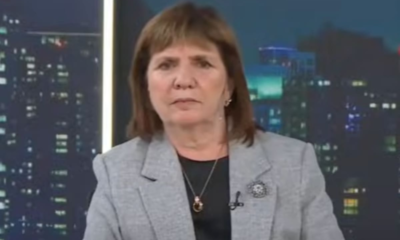INTERNACIONAL
“No estoy defendiendo la inmortalidad, solo que elijamos no morir”: Bryan Johnson habló sobre longevidad, IA y la revolución del Project Blueprint

Hace algunos años, Bryan Johnson saltó a la fama mundial como el multimillonario de la longevidad, pero su historia y ambiciones revelan mucho más que rituales y comportamientos llamativos. La iniciativa Project Blueprint, que lidera desde California, es tanto experimento personal como empresa biotecnológica: une inteligencia artificial, cuantificación exhaustiva y sistematización para desafiar los límites del envejecimiento humano.
Johnson cree que la clave para prolongar la existencia reside en la automatización estricta de la rutina, complementada por tecnología de punta y una filosofía centrada en la supervivencia.
Su residencia en Venice, California, se asemeja a un laboratorio, donde ningún detalle queda al azar: desde la comida y los suplementos hasta la recolección y almacenamiento de muestras biológicas, toda variable se encuentra bajo control.

Johnson somete su cuerpo a un régimen tan meticuloso como exhaustivo: su día inicia antes del amanecer con exposición a luz de 10.000 lux, control de temperatura, aplicación de sueros, ejercicio, terapia de luz roja, oxigenación, sauna y múltiples pruebas médicas. La dieta es exclusivamente vegetal, restringida a la mañana y antes del mediodía, e incluye decenas de suplementos para optimizar métricas que él considera clave.
En tanto, desde 2021, la estrategia de Blueprint incluye alimentar una inteligencia artificial —Bryan AI— con todos sus datos y declaraciones, con el objetivo de perfeccionar su régimen y avanzar hacia la potencial transferencia de conciencia a sistemas computacionales.
La visión de Johnson trasciende la salud personal: postula que la supervivencia debe ser el nuevo eje ético, capaz de suplantar la búsqueda de riqueza y estatus en el mundo contemporáneo.

En búsqueda de más información, el equipo de Wired visitó el peculiar hogar del millonario. A cada paso, notó detalles tan pulidos como los fruteros repletos de kiwis y plátanos, y al mismo tiempo tan imperfectos como una naranja mohosa, “algo, al parecer, huele mal en la finca de Johnson”, afirmaron.
Un dilema que, en palabras de quienes transitaron por este lugar, materializa un contraste y dilema de este personaje: Johnson construye un entorno artificial casi perfecto, pero choca de frente con los límites y “fallos” de la condición humana.
Durante la conversación, Johnson explica con detalle su rutina nocturna: “He construido toda mi existencia en torno al sueño”, afirma y deja en claro que el descanso no es solo una necesidad biológica, sino el pilar central de su estrategia de longevidad. “Mi perfil de sueño es el de alguien de veintitantos años: duermo ocho horas y 34 minutos, me levanto menos de una vez por noche, y tengo un 94 % de eficiencia”, detalla.

Su jornada, dice, empieza la noche anterior: se acuesta con precisión quirúrgica, se duerme en minutos y se despierta antes del amanecer, exponiéndose a luz intensa y midiendo parámetros como la temperatura basal, que en su caso ha descendido más de dos grados: “Hay pruebas de que las especies con temperaturas más bajas viven más”, afirma.
Cuando se le plantea, de manera directa, si alguna vez morirá —una pregunta que más parece filosófica que biológica—, Johnson responde sin titubeos: “Falso”, ya que todos sus datos y discursos ahora se encuentran dentro inteligencia artificial personalizada.
“Actualmente, de forma muy rudimentaria, tengo una IA de Bryan que ha asimilado todo lo que he dicho”, un cambio que, según afirma, redefine el valor de seguir vivo: “A medida que la tecnología mejora, el bien más preciado será la existencia; la inmortalidad, tal como la concebíamos antes, a través de los logros, la descendencia o la vida después de la muerte, se devaluará en comparación con la existencia. Esa es mi apuesta fundamental para el futuro”.

Como figura pública obsesionada con la longevidad, Johnson no ha escapado a las críticas. Algunas figuras han señalado que su nivel de control podría rozar comportamientos obsesivos o incluso patológicos.
Es más, durante la entrevista, se comparó su comportamiento con patrones de un trastorno de la conducta alimentaria (TCA), una afirmación que Johnson no evade: “La mayoría de la gente que conozco en Estados Unidos tiene un trastorno alimentario. Claramente, luché con el control de mi ingesta de alimentos”.
Defiende su enfoque como una estrategia racional frente a un entorno saturado de estímulos adictivos. “¿Por qué iba a luchar contra decisiones cotidianas, diversas y, en última instancia, irrelevantes, cuando pueden automatizarse? Prefiero dedicar mi escasa capacidad cerebral a pensar en cosas de mayor nivel, como el futuro de la raza humana”, sostiene.
La automatización —para Johnson— es una estrategia de autonomía frente a un entorno saturado de algoritmos que incentivan el consumo y las adicciones. Su objetivo es crear un entorno de máxima libertad personal, donde las decisiones menores están automatizadas y controladas por datos; solo así puede concentrar energía intelectual en desafíos trascendentes.
En la entrevista, Johnson deja en claro que su cruzada trasciende el negocio o la autoexperimentación. Proclama la necesidad de una nueva ideología global: “La nueva respuesta a la existencia es que la existencia misma es la virtud suprema. No estoy defendiendo la inmortalidad ni la utopía. Solo digo que elijamos no morir”, afirma.
Con esta premisa, busca reemplazar antiguos sistemas de creencias y paradigmas políticos con una suerte de “religión” centrada en la supervivencia —individual y colectiva—, capaz de alinear tanto a humanos como a algoritmos bajo el principio Don’t Die.
Johnson reconoce que la fama no es un efecto colateral, sino un instrumento: “Si tuviera que elegir entre la fama y mil millones de dólares, la elegiría cien veces. Es muy difícil de conseguir. Tiene un valor excepcional”. Según él, solo con ese alcance es posible impulsar la ideología “de mayor crecimiento en la historia” y guiar la transición de la especie hacia una nueva etapa evolutiva.
Cree, en definitiva, que “algo surgirá y llenará este vacío, ya sea ‘No Mueras’ o algo más”. Su ambición no es solo extender la vida, sino fundar un nuevo marco de sentido que le dé respuesta —en términos prácticos y éticos— a los grandes dilemas del siglo XXI: la conciencia, la muerte y el futuro de la humanidad frente a la inteligencia artificial. Es que, en última instancia, espera que el legado de su experimento no se mida solo en métricas de salud o tecnología.
El ascenso de Johnson no estuvo exento de conflictos. Enfrentó disputas legales con su expareja Taryn Southern y varios exempleados, cuestionamientos por el uso extensivo de acuerdos de confidencialidad y reportajes que pusieron en duda la integridad de sus productos y la estabilidad financiera de su empresa. Pero, independientemente del futuro comercial de Blueprint, Johnson insiste en que su propósito real trasciende lo económico.
Su empeño está en sostener una visión filosófica y radicalmente transparente sobre la existencia: “Quiero que, en el siglo 25, digan que fue entonces cuando la humanidad descubrió que era la primera generación que no moriría”, afirma.
Lo que propone es un desplazamiento de las prioridades humanas: “Ahora mismo, lo único que tenemos en común es que nadie quiere morir”. En su visión, la inteligencia artificial no es solo una tecnología, sino un punto de inflexión que obliga a repensar cómo vivimos y decidimos. “Cuando surgen tecnologías transformadoras, necesitamos nuevas ideologías que nos ayuden a tomar decisiones cotidianas. Hoy no existe ninguna”, advierte.
Por eso concibe su cruzada como algo más que biotecnología o disciplina física: se trata de diseñar un nuevo marco de sentido frente al cambio irreversible: “No estoy defendiendo la inmortalidad. Solo estoy diciendo que elijamos no morir”, concluye.
bryan johnson
INTERNACIONAL
Tailandia advirtió que los enfrentamientos armados con Camboya podrían derivar en una guerra “a gran escala”

Tailandia advirtió este viernes que los enfrentamientos armados con Camboya podrían escalar a una guerra a gran escala, en el segundo día consecutivo de hostilidades que ha dejado al menos 16 muertos y obligado a evacuar a más de 138.000 personas en ambos lados de la frontera.
“Si la situación se agrava podría derivar en una guerra, aunque por ahora sigue limitada a enfrentamientos”, declaró el primer ministro interino tailandés, Phumtham Wechayachai, ante la prensa en Bangkok.
La tensión se disparó el jueves debido a una disputa territorial de décadas entre los dos países del sudeste asiático, con combates que incluyeron el uso de tanques, aviones de combate, artillería y cohetes BM-21.
Se trata de la escalada militar más grave desde 2011 en una zona de 800 kilómetros de frontera, donde persisten áreas no delimitadas oficialmente, salpicadas de templos antiguos.
Según el Ministerio del Interior tailandés, las autoridades evacuaron a 138.000 civiles, incluidos 428 pacientes hospitalarios, desde cuatro provincias limítrofes con Camboya.
El balance oficial en Tailandia ascendió a 15 muertos —un soldado y 14 civiles— y 46 heridos. Por su parte, Camboya reportó un muerto y cinco heridos, en su primer informe oficial desde el inicio del conflicto.

Los enfrentamientos se reanudaron en la madrugada del viernes en tres puntos distintos, de acuerdo con el ejército tailandés. Según su versión, las fuerzas camboyanas lanzaron fuego con armas pesadas, artillería y cohetes múltiples, a lo que las tropas tailandesas respondieron con “fuego de apoyo apropiado”. El ejército agregó que los choques incluyeron seis zonas de combate el jueves, entre ellas dos antiguos templos.
En el municipio camboyano de Samraong, a 20 kilómetros de la frontera, periodistas de la agencia AFP registraron disparos lejanos de artillería durante la mañana. “Vivo muy cerca de la frontera. Tenemos miedo porque empezaron a disparar de nuevo sobre las 6 de la madrugada”, relató Pro Bak, un residente de 41 años que huía con su familia hacia un templo budista. “No sé cuándo podremos volver a casa”, añadió.
La crisis diplomática también se agravó. Tailandia expulsó al embajador camboyano y llamó a consultas a su representante en Phnom Penh, luego de que una mina terrestre hiriera a cinco soldados tailandeses. Camboya respondió retirando a todos sus diplomáticos en Bangkok, excepto uno, y degradando las relaciones al nivel más bajo.
El Consejo de Seguridad de la ONU se reunirá de urgencia y a puerta cerrada este viernes, tras una solicitud del primer ministro camboyano, Hun Manet.

En paralelo, Estados Unidos y Francia instaron al cese inmediato de las hostilidades, mientras que la Unión Europea y China expresaron una profunda preocupación y pidieron diálogo entre las partes.
Desde 2008 hasta 2011, los dos países ya libraron enfrentamientos en la zona, que dejaron 28 muertos y decenas de miles de desplazados. Una decisión de la Corte Internacional de Justicia en favor de Camboya calmó las tensiones durante una década. Sin embargo, la situación volvió a deteriorarse en mayo de este año, tras la muerte de un soldado camboyano en un nuevo choque fronterizo.
Los combates actuales reflejan la fragilidad de la paz en la región y han despertado la preocupación de la Asociación de Naciones del Sudeste Asiático (ASEAN).
El primer ministro de Malasia, Anwar Ibrahim, quien ocupa la presidencia rotativa del bloque, declaró haber hablado con sus homólogos de Camboya y Tailandia, a quienes pidió diálogo inmediato. Según dijo, ambos mostraron “señales positivas y predisposición” a buscar una salida pacífica.
(Con información de AFP)
Asia / Pacific,Defense,Diplomacy / Foreign Policy,SINGAPORE
INTERNACIONAL
Fox News Poll: The GOP is seen as more likely to have a clear plan for the country

NEWYou can now listen to Fox News articles!
With the 2026 midterm elections more than a year away, a new Fox News survey finds that while the Republican Party has lost some ground to the Democratic Party on handling key issues, voters are more likely to think the GOP has a clear plan for dealing with the country’s problems.
The survey, released Thursday, finds that by a 10-point margin, more voters think the Republicans have a clear plan for the U.S. than the Democrats: 43% vs. 33%. Still, majorities feel neither the GOP (54%) or the Democrats (64%) have a plan. This is about where sentiment was three years ago, the last time the question was asked.
FOX NEWS POLL: TRUMP FACING HEADWINDS AT SIX-MONTH MARK
Far more Republicans (79%) than Democrats (51%) are confident their party has a clear plan, and that’s what hurts the Democrats. While at least two-thirds of independents feel neither party has a plan, more trust the GOP (30% vs. 25%).
At the same time, the survey shows some significant erosion in the GOP’s handling of key issues compared to the last time Fox asked in 2023, including in areas where they are traditionally preferred.
Voters view the Republican Party as better able to handle national security (by 14 points), immigration (+6R), and government spending (+5R) while the Democratic Party is favored on climate change (by 23 points), health care (+19D), social security (+17D), education (+15D), and energy policies (+6D).
The parties are rated about equally on inflation (+1D), gun policy (even), the economy (+1R), and foreign policy (+3R).
Compared to 2023, support for the GOP is down on immigration by 4 points, national security by 6, government spending by 6, foreign policy by 9, and the economy by 14. Plus, the Republicans’ 12-point advantage on inflation has disappeared, as Democrats have a 1-point edge today.
While the Democrats have largely maintained support on their best issues, it’s noteworthy they saw a 12-point increase on education, as voters have been split on who would better handle the issue for the last few years.
FOX NEWS POLL: APPROVAL OF SCOTUS AT 5-YEAR HIGH, REBOUNDING FROM RECORD LOW IN 2024
These shifts can mostly be attributed to self-identified Democrats solidifying their preference for their own party’s handling of the issues, as well as independents lessening their support for Republicans or switching to Democrats.
Self-identified Republicans continue to express high levels of support for their party on the issues.
«Independents and even some Democrats had soured on President Biden and the Democratic Congress by 2023 and 2024, but they have shifted to the left a bit in 2025 in response to the policies of President Trump and the Republicans,» says Republican pollster Daron Shaw, who conducts the Fox News survey with Democrat Chris Anderson. «An appreciable part of this is performance related. Without obvious economic and foreign policy victories, independents and soft Democrats could drift to the left, which could scramble the electoral dynamic heading into 2026.»
Overall, views of both major political parties are underwater. By 2 points, the Republican Party has a slightly better favorable rating (44% favorable) than the Democratic Party (42%), but more than half view both parties negatively (56% and 57% unfavorable, respectively). That’s relatively unchanged since April.
Positive views of the Republican Party have shown steady growth since October 2019, while the Democratic Party has been on a downward trajectory, reaching a record low in April (41% favorable).
The Republican Party enjoys more support among their party faithful (83% have a favorable view) than the Democratic Party (78% favorable). Seven in 10 independents have a negative view of both.
CLICK HERE FOR CROSSTABS AND TOPLINE
Conducted July 18-21, 2025, under the direction of Beacon Research (D) and Shaw & Company Research (R), this Fox News survey includes interviews with a sample of 1,000 registered voters randomly selected from a national voter file. Respondents spoke with live interviewers on landlines (114) and cellphones (636) or completed the survey online after receiving a text (250). Results based on the full sample have a margin of sampling error of ±3 percentage points. Sampling error for results among subgroups is higher. In addition to sampling error, question wording and order can influence results. Weights are generally applied to age, race, education, and area variables to ensure the demographics of respondents are representative of the registered voter population. Sources for developing weight targets include the American Community Survey, Fox News Voter Analysis and voter file data.
INTERNACIONAL
«Fake news»: la Casa Blanca trata despegar a Donald Trump del caso Epstein y frenar la tormenta política

La ofensiva contra Barack Obama
Donald Trump,Jeffrey Epstein,Estados Unidos

 ECONOMIA3 días ago
ECONOMIA3 días agoEl consumo en Argentina crece 4% en junio, ante menor inflación y más crédito

 POLITICA1 día ago
POLITICA1 día agoMáximo Kirchner declaró una fortuna de 8.300 millones de pesos: representa un 76% más que el año anterior

 POLITICA2 días ago
POLITICA2 días agoLos organizadores de la Derecha Fest pasaron un video de Villarruel y algunos asistentes gritaron “traidora”

























